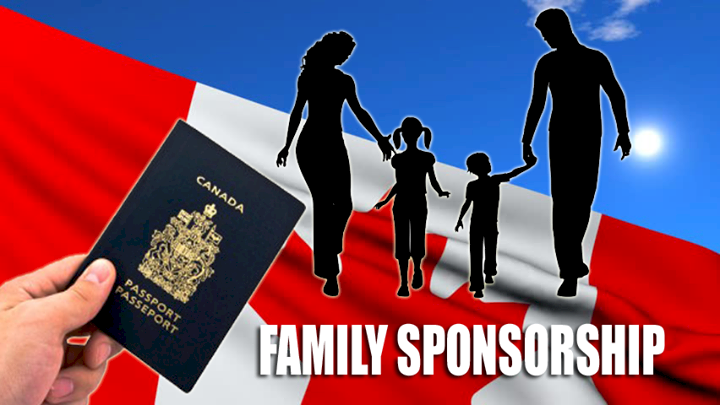
 Immigration
Immigration
Canada is well-known for its welcoming immigration policies, and one of the most popular pathways to permanent residency is through the Family Sponsorship Visa. If you are a permanent resident or citizen of Canada, you might be wondering who you can sponsor to join you in this beautiful country. Understanding the eligibility criteria and the process is essential for making informed decisions. This blog will walk you through who you can sponsor, the benefits of the program, and some practical tips to guide you through the application process.
The Family Sponsorship Visa is an immigration program that allows Canadian citizens and permanent residents to sponsor their family members to become permanent residents in Canada. Managed by Immigration, Refugees, and Citizenship Canada (IRCC), this program focuses on reuniting families and helping loved ones live, work, and thrive in Canada.
Once approved, the sponsored family member becomes a permanent resident, giving them access to healthcare, education, and employment rights—similar to any other permanent resident in Canada. It also opens up pathways for them to pursue Canadian citizenship down the line.
“For instance, Sarah, a Canadian permanent resident originally from Ghana, was able to sponsor her spouse to join her in Toronto, making it possible for them to build their life together in Canada.”

Canada allows specific family members to be sponsored under this program. Let’s dive into the categories of individuals you can sponsor and what to consider for each:
Spouse or Common-Law Partner
One of the most common groups sponsored under this visa is spouses or common-law partners. To sponsor your spouse, you must prove that your relationship is genuine. For common-law partners, you’ll need to show that you’ve lived together for at least 12 consecutive months.
Once your spouse is approved, they receive permanent resident status, allowing them to live, work, and access healthcare in Canada. Over time, they may also become eligible for Canadian citizenship.
Tips for Sponsoring a Spouse:
“When Amar from India sponsored his wife under Canada’s family sponsorship program, they were asked to provide detailed evidence of their relationship, including photographs and proof of joint financial responsibilities.”
If you have children under the age of 22 who are not married or in a common-law relationship, they qualify as dependent children and can be sponsored. This includes biological and adopted children.
For adopted children, additional documentation and background checks are often required to ensure the child’s eligibility.
Tips for Sponsoring Dependent Children:
“Josephine from Nigeria adopted her nephew after a family tragedy. By providing the necessary documentation and demonstrating her ability to care for him in Canada, she was able to sponsor him as her dependent child.”
Parents and grandparents are another group eligible for sponsorship under Canada’s Family Sponsorship Program. You’ll need to meet specific income requirements to show that you can financially support them in Canada. Alternatively, Canada’s Super Visa allows parents and grandparents to visit for extended periods (up to 5 years at a time) without needing frequent renewals.
Tips for Sponsoring Parents or Grandparents:
“John from Cameroon brought his parents to Canada on a Super Visa before applying for their permanent residency. This allowed them to live with him for up to 5 years without worrying about visa renewals.”
You can also sponsor orphaned siblings, nephews, nieces, or grandchildren, provided they are under 18 and not married or in a common-law relationship. This is a helpful option for family members who have lost their parents and need a permanent home.
Tips for Sponsoring Orphaned Relatives:
“Mariam from Ghana sponsored her orphaned niece to come to Canada after the loss of her sister. The process involved legal proof of guardianship and meeting specific immigration requirements.”
To sponsor a family member under the Family Sponsorship Visa, both the sponsor and the person being sponsored must meet certain eligibility criteria.
Eligibility for the Sponsor:
Eligibility for the Sponsored Person:

The Family Sponsorship Program offers numerous benefits for both sponsors and sponsored family members.
Reunification with Loved Ones
The main benefit is the ability to live together with your family in Canada, fostering stronger relationships and providing support for each other in a new country.
Permanent Residency Status
Sponsored family members gain permanent residency in Canada, giving them access to healthcare, education, and work opportunities.
“Maria sponsored her husband to join her in Vancouver, allowing him to not only reunite with his family but also access Canada’s top-tier healthcare system.”
Pathway to Canadian Citizenship
For those who wish to pursue citizenship, family sponsorship is a step toward Canadian citizenship. Once permanent residency is secured, family members can apply for citizenship after meeting residency and legal requirements.
“After living in Montreal for a few years as a permanent resident, Carlos from Colombia was able to apply for Canadian citizenship, fulfilling his dream of becoming a Canadian citizen.”
Applying for Canada’s Family Sponsorship Visa involves several steps, but breaking them down makes the process more manageable.
Step 1: Ensure You Meet the Eligibility Requirements
Before starting, confirm that you and the person you’re sponsoring meet the criteria set by IRCC, including financial requirements and proof of your relationship.
Step 2: Complete the Application Forms
Download and fill out the necessary forms from IRCC’s website. Make sure that all information is accurate and that supporting documents are attached to avoid delays.
Step 3: Submit the Application
Submit the completed application along with the required fees. You may also need to submit a sponsorship agreement to prove that you’ll be financially responsible for the person you’re sponsoring.
Step 4: Wait for Processing
Processing times vary depending on the type of sponsorship. Spousal sponsorship typically takes around 12 months, while parental sponsorship may take longer due to higher demand.

Navigating Canada’s Family Sponsorship Visa process can be complex, but understanding who you can sponsor and the steps involved will help you make informed decisions. Whether you’re sponsoring a spouse, child, or parent, following the correct process and ensuring your documentation is complete will increase the chances of success.
Need help with your application? Reach out to SayHomeCanada for personalized support and guidance through the family sponsorship process.
Here’s the review of your blog on Canada’s Family Sponsorship Visa, with a focus on expanding the points to make the content more engaging and accessible to readers. Additionally, I’ll implement the suggestions I’ve recommended for improving the overall structure and connection with your audience.
Canada is well-known for its welcoming immigration policies, and one of the most popular pathways to permanent residency is through the Family Sponsorship Visa. If you are a permanent resident or citizen of Canada, you might be wondering who you can sponsor to join you in this beautiful country. Understanding the eligibility criteria and the process is essential for making informed decisions. This blog will walk you through who you can sponsor, the benefits of the program, and some practical tips to guide you through the application process.
The Family Sponsorship Visa is an immigration program that allows Canadian citizens and permanent residents to sponsor their family members to become permanent residents in Canada. Managed by Immigration, Refugees, and Citizenship Canada (IRCC), this program focuses on reuniting families and helping loved ones live, work, and thrive in Canada.
Once approved, the sponsored family member becomes a permanent resident, giving them access to healthcare, education, and employment rights—similar to any other permanent resident in Canada. It also opens up pathways for them to pursue Canadian citizenship down the line.
“For instance, Sarah, a Canadian permanent resident originally from Ghana, was able to sponsor her spouse to join her in Toronto, making it possible for them to build their life together in Canada.”
Canada allows specific family members to be sponsored under this program. Let’s dive into the categories of individuals you can sponsor and what to consider for each:
Spouse or Common-Law Partner
One of the most common groups sponsored under this visa is spouses or common-law partners. To sponsor your spouse, you must prove that your relationship is genuine. For common-law partners, you’ll need to show that you’ve lived together for at least 12 consecutive months.
Once your spouse is approved, they receive permanent resident status, allowing them to live, work, and access healthcare in Canada. Over time, they may also become eligible for Canadian citizenship.
Tips for Sponsoring a Spouse:
“When Amar from India sponsored his wife under Canada’s family sponsorship program, they were asked to provide detailed evidence of their relationship, including photographs and proof of joint financial responsibilities.”
Dependent Children
If you have children under the age of 22 who are not married or in a common-law relationship, they qualify as dependent children and can be sponsored. This includes biological and adopted children.
For adopted children, additional documentation and background checks are often required to ensure the child’s eligibility.
Tips for Sponsoring Dependent Children:
“Josephine from Nigeria adopted her nephew after a family tragedy. By providing the necessary documentation and demonstrating her ability to care for him in Canada, she was able to sponsor him as her dependent child.”
Parents and Grandparents
Parents and grandparents are another group eligible for sponsorship under Canada’s Family Sponsorship Program. You’ll need to meet specific income requirements to show that you can financially support them in Canada. Alternatively, Canada’s Super Visa allows parents and grandparents to visit for extended periods (up to 5 years at a time) without needing frequent renewals.
Tips for Sponsoring Parents or Grandparents:
“John from Cameroon brought his parents to Canada on a Super Visa before applying for their permanent residency. This allowed them to live with him for up to 5 years without worrying about visa renewals.”
Sponsoring Orphaned Relatives
You can also sponsor orphaned siblings, nephews, nieces, or grandchildren, provided they are under 18 and not married or in a common-law relationship. This is a helpful option for family members who have lost their parents and need a permanent home.
Tips for Sponsoring Orphaned Relatives:
“Mariam from Ghana sponsored her orphaned niece to come to Canada after the loss of her sister. The process involved legal proof of guardianship and meeting specific immigration requirements.”
To sponsor a family member under the Family Sponsorship Visa, both the sponsor and the person being sponsored must meet certain eligibility criteria.
Eligibility for the Sponsor:
Eligibility for the Sponsored Person:
Applying for Canada’s Family Sponsorship Visa involves several steps, but breaking them down makes the process more manageable.
Step 1: Ensure You Meet the Eligibility Requirements
Before starting, confirm that you and the person you’re sponsoring meet the criteria set by IRCC, including financial requirements and proof of your relationship.
Step 2: Complete the Application Forms
Download and fill out the necessary forms from IRCC’s website. Make sure that all information is accurate and that supporting documents are attached to avoid delays.
Step 3: Submit the Application
Submit the completed application along with the required fees. You may also need to submit a sponsorship agreement to prove that you’ll be financially responsible for the person you’re sponsoring.
Step 4: Wait for Processing
Processing times vary depending on the type of sponsorship. Spousal sponsorship typically takes around 12 months, while parental sponsorship may take longer due to higher demand.
Navigating Canada’s Family Sponsorship Visa process can be complex, but understanding who you can sponsor and the steps involved will help you make informed decisions. Whether you’re sponsoring a spouse, child, or parent, following the correct process and ensuring your documentation is complete will increase the chances of success.
Need help with your application? Reach out to SayHomeCanada for personalized support and guidance through the family sponsorship process.

To sponsor a family member under Canada’s Family Sponsorship Visa, you must be at least 18 years old and a Canadian citizen or permanent resident. You must also prove financial stability to ensure the person you’re sponsoring won’t rely on social assistance.
Want to check your eligibility? Contact SayHomeCanada for a personalized assessment.
You can sponsor your spouse, common-law partner, dependent children, parents, grandparents, and certain orphaned relatives under Canada’s Family Sponsorship Program.
Need help determining eligibility? Get expert advice from SayHomeCanada today.
Processing times for family sponsorship applications vary, but spousal sponsorship typically takes around 12 months, while parental sponsorship may take longer.
Want a detailed timeline for your application? Contact SayHomeCanada for expert guidance.
Yes, permanent residents can sponsor family members as long as they meet specific criteria, such as residing in Canada and having the financial capability to support the sponsored individual.
Need more details on your eligibility as a sponsor? Let SayHomeCanada guide you.
Yes, you have the right to appeal if your family sponsorship application is refused. The appeal must be submitted within 30 days of receiving the refusal.
Need help with an appeal? Get expert legal advice from SayHomeCanada.
Thank you for the response .
Let's Connect